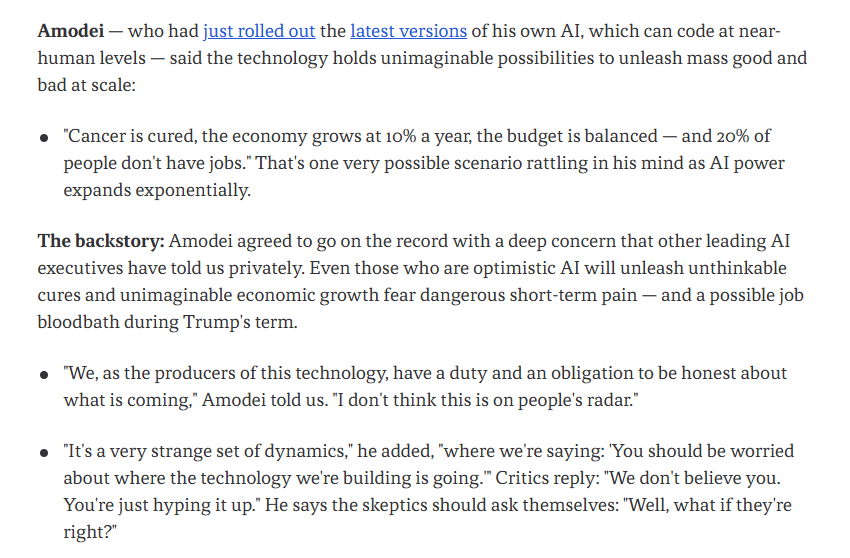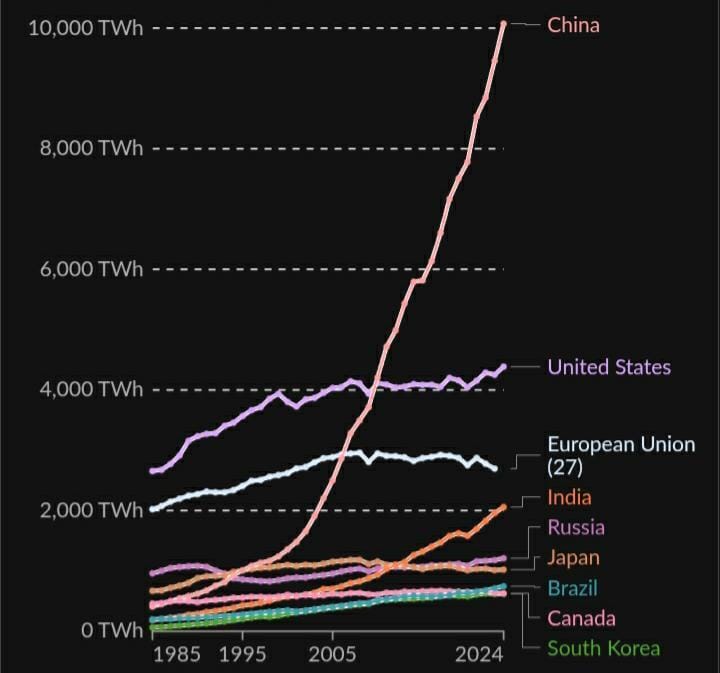Dear Readers,
What a week! DeepSeek r1 has received a surprisingly large update and is now almost on par with o3 in benchmarks such as livecodebench. Speculation is that this update was actually intended as r2, but was released as an update first due to strong competition.
However, Dario Amodei's interview caused even more of a stir in the media: he is deeply concerned that AI could cause unemployment to rise to as much as 20% within a few years – with unforeseen consequences for the entire world.
In Saturday's DeepDive, we therefore focus on the question of the future of the labor market. What can we expect, and what does the empirical data tell us? But more on that in the main article.
In Today’s Issue:
Anthropic CEO warns AI could wipe out 1 in 5 jobs within five years
Boston Dynamics gives its robot sharper “eyes” for the real world
First-ever AI-made discovery lands in an elite academic conference
Real-time, interactive AI video is here—no game engine required
And more AI goodness…
All the best,

AI Could Push Unemployment to 10–20%, Warns Anthropic CEO
The TLDR
AI is rapidly replacing traditional entry-level white-collar jobs, with CEOs like Dario Amodei warning entire professions could vanish within five years. Companies aren’t just cutting costs—they’re favoring faster, cheaper AI output across industries like law, finance, and marketing. As disruption accelerates, urgent societal responses are needed to ensure the transition leads to equitable progress rather than mass displacement.
While companies around the world are refining their AI strategies, something is happening that has gone almost unnoticed: traditional entry-level office jobs – often a springboard for careers – are beginning to disappear. Dario Amodei, CEO of Anthropic, warns urgently that within the next five years, AIs such as Claude 4 could replace entire professions in the white-collar sector. The automation of cognitive work is not happening sometime in the future – it is happening now, and it is hitting the youngest members of the system first.
Current AI models are already taking over tasks in legal analysis, finance, marketing, and software development. According to Axios, a clear pattern is emerging: companies are not hiring fewer people because they want to save money, but because AI delivers the same output faster and cheaper. This is a turning point for the AI community: the disruptive power of this technology demands new answers – political, social, and economic. Proposals such as a “token tax” on AI use aim to distribute productivity gains fairly. But even more important is a vision for a future in which humans and machines complement each other rather than replace each other.
Why it matters: AI-driven change in the labor market affects millions. Without timely preparation, social upheaval looms – but with preparation, the opportunity for a fairer, smarter world of work opens up.
Source:
Ad
Get the tools, gain a teammate
Impress clients with online proposals, contracts, and payments.
Simplify your workload, workflow, and workweek with AI.
Get the behind-the-scenes business partner you deserve.
In The News
Atlas Needs Smarter Eyes to Thrive in the Real World
Humanoid robots like Atlas must understand both the shape and context of their surroundings to operate effectively in diverse environments like homes, warehouses, and factories. This means recognizing objects not just visually, but functionally—knowing what something is and how it’s used. To move and respond with human-like agility, Atlas depends on a perception system that’s just as adaptive. Boston Dynamics is now focusing on upgrading this crucial sensory intelligence to bring general-purpose robotics closer to reality.
Zochi: First AI to Publish at Top Conference
An AI agent named Zochi has made history by producing the first fully AI-generated scientific discovery accepted in the main track of an A* conference—ACL 2025. Positioned as the first PhD-level autonomous researcher, Zochi is now in open beta.
Real-Time Interactive AI Video Debuts
A breakthrough in AI video lets you watch and interact with scenes in real-time, powered by a world model generating frames every 40ms—no game engine needed. It’s called interactive video, and it’s now live for anyone to try (GPU limits apply).
Graph of the Day
China is investing a lot of capacity in the expansion of its energy infrastructure and is creating an exponential increase in electricity.
The rest of the world has some catching up to do if it wants to keep up. This is not a sure-fire success, but a necessary investment.

US budget bill with 10-year ban on state AI regulation
The US House of Representatives has passed the comprehensive budget bill “One Big Beautiful Bill,” which, among other things, includes a ten-year ban on US states enacting or enforcing their own laws to regulate artificial intelligence. Supporters argue that this promotes innovation and enables uniform federal standards. Critics, however, see it as a threat to consumer protection and an increase in power for Big Tech. The regulation could repeal existing laws to combat deepfakes, algorithmic discrimination, and data protection. The bill faces bipartisan opposition and procedural hurdles in the Senate.
Texas fails to ban social media for minors – focus on data protection and fundamental rights
A Texas bill that would have banned minors under the age of 18 from accessing social media platforms such as TikTok, Snapchat, and Instagram has failed in the Senate. Although the House of Representatives had passed the bill, it was not brought to a vote in the Senate due to concerns about freedom of expression and data protection. At the same time, Governor Greg Abbott signed a law requiring app stores to verify the age of users and obtain parental consent for minors. These developments reflect the growing trend toward protecting children online, but raise questions about the balance between protective measures and fundamental rights.
Nvidia defies export ban – and criticizes US policy toward China
Despite Trump's export ban on AI chips to China, Nvidia reports a record quarter with 69% revenue growth – demand from the US compensates for the lost $2.5 billion in revenue. However, CEO Jensen Huang warns that excluding China could backfire geopolitically – “China's AI is advancing even without US chips.” His criticism shows how technological power politics is increasingly shifting economic dynamics – with consequences for competitiveness, alliances, and global technology standards.
Question of the Day
Are you in favor of banning social media for people under the age of 18?
Quote of the Day

Sponsored By HubSpot
A longstanding partner, HubSpot is an all-in-one CRM platform—fusing marketing automation, sales, service, CMS and ops—built on the “inbound” philosophy and now powering 180 k+ businesses across 135 countries.












